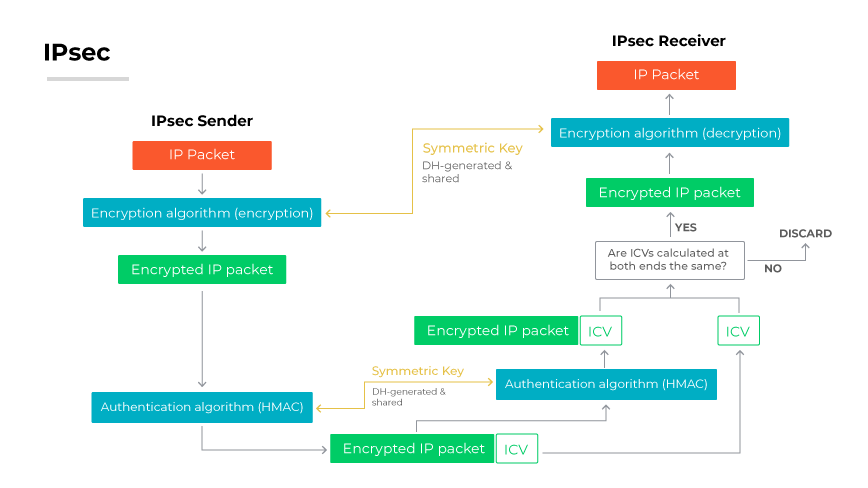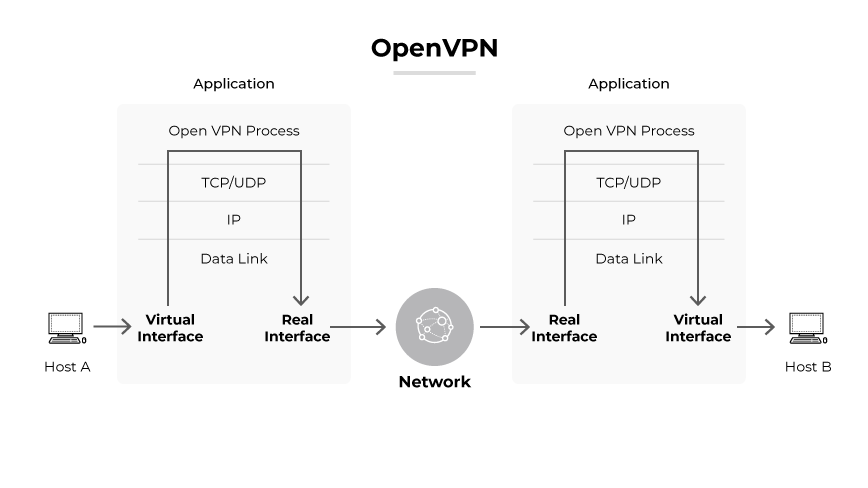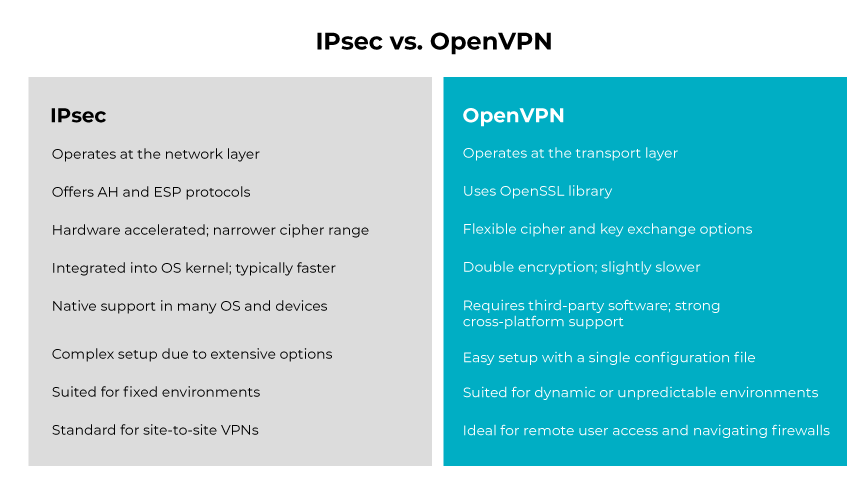IPsec vs. OpenVPN: What Are the Differences?
IPsec is a protocol suite designed to secure IP communications through authentication and encryption, while OpenVPN is an open source protocol that offers flexible encryption options and uses SSL/TLS for key exchange.
IPsec directly operates on the network layer, offering robust security features native to many operating systems. It is commonly used for site-to-site VPNs, but configuration can be complex. OpenVPN operates on the transport layer, providing a customizable VPN solution through its use of the OpenSSL library. OpenVPN is also compatible with many operating systems, but is more commonly used for remote access.
What Is IPsec?

IPsec (Internet Protocol Security) is a protocol suite designed to secure communications over IP networks. IPsec achieves this by authenticating and encrypting each IP packet during a session. The IPsec protocol is commonly used in virtual private networks (VPNs) to ensure safe data transit over unsecured networks, such as the internet.
The foundation of IPsec is the establishment of a Security Association (SA) between communicating devices. An SA outlines the methods and cryptographic keys for encryption and authentication, ensuring both parties agree on the security policy. This mutual agreement is critical for maintaining a trustworthy communication channel.
To safeguard data packets, IPsec employs two main protocols: Authentication Header (AH) and Encapsulating Security Payload (ESP). AH ensures the authentication and integrity of the data, verifying that it has not been altered during transmission. ESP encrypts the packet's payload to protect the data from potential eavesdropping while also providing integrity and authentication.
IPsec encapsulates data packets with either an AH or ESP header, securing the data from its source to its destination. Encapsulation maintains the confidentiality and integrity of the data throughout its journey across various networks.
Two IPsec modes command how data is protected when sent across networks: Tunnel Mode and Transport Mode. Tunnel Mode encrypts the entire IP packet for safeguarding data between network gateways. Transport Mode encrypts just the payload, which is ideal for end-to-end data integrity between hosts. The selection between Tunnel and Transport Mode is based on the network infrastructure's specific requirements and the sensitivity of the data in transit.
The dynamic nature of IPsec involves continuous key management and the need for periodic renegotiation of SAs. This ensures that the secure connection adapts to new threats and does not become a liability over time. When a secure session is no longer necessary, the associated SA is terminated, closing the secure channel to prevent unauthorized access.
What Is OpenVPN?

OpenVPN is an open source protocol often used to establish secure communications over the internet. The protocol is known for its versatility and robust security, which makes it a common choice in enterprise VPN solutions. OpenVPN allows secure tunneling of IP traffic using a variety of authentication and encryption methods.
The OpenVPN protocol can create secure point-to-point or site-to-site connections in routed or bridged configurations and remote access facilities. It uses a custom security protocol that utilizes SSL/TLS for key exchange, which allows it to traverse firewalls and network address translators (NATs).
OpenVPN offers a range of options for encryption, including up to 256-bit encryption through the OpenSSL library, which is an implementation of SSL and TLS protocols. This level of encryption is considered highly secure, making OpenVPN a reliable choice for protecting sensitive corporate communications. OpenVPN is capable of withstanding most types of attacks, including man-in-the-middle and brute-force attacks.
A key aspect of OpenVPN's flexibility is its compatibility with various operating systems, ranging from Windows and macOS to less common platforms like Solaris and FreeBSD. OpenVPN does not come built in with most operating systems and typically requires the installation of additional software to function.
OpenVPN supports both TCP and UDP transport protocols. TCP is known for reliability, ensuring data packets are delivered in the correct order and without loss. UDP is faster but does not guarantee the delivery of packets. The choice between TCP and UDP depends on the specific requirements of the network and the desired balance between speed and reliability.
OpenVPN vs. IPsec

Security Features
When evaluating IPsec and OpenVPN, security features are paramount. IPsec operates at the network layer and offers a suite of protocols to secure the data flow, such as AH and ESP. It is particularly strong in providing data integrity, confidentiality, and authentication. IPsec is often hardware accelerated, which can lead to a narrower range of cipher suites compared to OpenVPN. IPsec is a mature technology with a strong track record in protecting enterprise communication.
OpenVPN operates at the transport layer and uses the OpenSSL library, which supports a wide range of cryptographic algorithms. This allows for a highly secure environment with flexible cipher and key exchange options. OpenVPN's strength lies in its adaptability to different security requirements and its resilience against various attack vectors.
Performance and Speed
Performance is a critical factor in choosing a VPN protocol. IPsec is typically faster. IPsec also benefits from its integration into the operating system's kernel, allowing for efficient packet processing and less overhead. OpenVPN is slightly slower because of double encryption, but it still offers adequate performance for most enterprise applications. OpenVPN is particularly effective over TCP, where it can handle unreliable networks by retrying connections.
Compatibility and Integration
IPsec enjoys broad native support across many operating systems and network devices, facilitating its integration into existing infrastructure with minimal effort. Widespread compatibility has made it a standard in the industry, especially for site-to-site VPNs.
OpenVPN requires third party software but boasts strong cross platform support, ranging from desktop and mobile operating systems to specialized firmware on network devices. Its flexibility and open source nature mean that it can be adapted to almost any network requirement, which is invaluable for businesses with diverse and evolving network ecosystems.
Implementation and Configuration
Implementation complexity can influence the choice between IPsec and OpenVPN. IPsec's configuration is more complex because of its extensive options and the necessity to set up each endpoint with compatible settings. OpenVPN is known for its ease of setup and configuration, often requiring only a single configuration file to get started. Easier setup can be a significant advantage in rapidly changing enterprise environments.
Network Environment Adaptability
Both protocols have strengths in different scenarios when it comes to adaptability. IPsec is ideal for fixed environments where it can leverage existing infrastructure and hardware capabilities. OpenVPN shines in dynamic or unpredictable environments, such as mobile connectivity or across diverse networks, because of its ability to adapt to various network conditions and its robustness over unstable connections.
IPsec VPN vs. OpenVPN Solutions
An IPsec VPN typically refers to a network that utilizes the IPsec protocol suite to establish secure encrypted connections between devices, often for site-to-site links. This kind of VPN is used for its deep integration into network infrastructure and devices. IPsec VPN solutions provide robust security at the IP layer that is particularly suited for connecting multiple fixed locations within an organization's network.
An OpenVPN solution is known for its flexibility and compatibility with various operating systems, making it ideal for providing remote user access to a network. Since OpenVPN can run on any port, it is easier to navigate through firewalls. This facilitates remote access even in restrictive network environments.
How to Choose Between IPsec and OpenVPN
When selecting between IPsec and OpenVPN for an enterprise VPN solution, it is critical to assess specific needs. IPsec is deeply integrated into many enterprise grade devices and operating systems. Its direct integration into network hardware often translates into higher throughput and stability, a vital factor for constant, high volume data flows.
OpenVPN, being user space software, offers greater flexibility and is often preferred for client-to-site connections. The protocol is particularly suitable for remote workforce scenarios, where users need to securely access corporate resources from various locations and on different devices. OpenVPN's compatibility with multiple platforms and its ability to operate over any port make it versatile for bypassing network restrictions. For businesses looking for a balance between strong security measures and flexible, adaptable remote access, OpenVPN may offer the most benefits.
In the context of enterprise security, both protocols meet high security standards but cater to different network architectures and use cases. The decision should align with the organization's infrastructure, required security posture, and network design principles.
Is WireGuard a Reliable Alternative to IPsec and OpenVPN?
WireGuard has emerged as a modern VPN protocol option, known for its lean design and ease of use. WireGuard offers reliable performance with a simpler, less resource intensive approach. This approach often results in faster speeds compared to traditional protocols like IPsec and OpenVPN. Efficiency and strong encryption standards make WireGuard a viable option for enterprises seeking a secure, agile, and easy to deploy VPN solution.
WireGuard's simplicity comes with tradeoffs. Limited configuration options can pose challenges for large organizations that require extensive customization or have complex network needs. For businesses seeking a straightforward, secure, efficient VPN protocol, WireGuard presents an alternative that may align well with evolving enterprise network requirements. Its cross platform compatibility can be appealing, offering a versatile solution for a variety of network architectures.